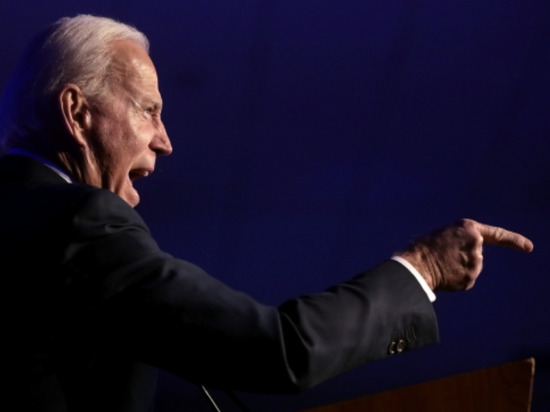Washington threatened the Arabs with consequences for evading anti-Russian sanctions
[ad_1]

A senior US Treasury Department official recently traveled to the United Arab Emirates (UAE) to warn a regional business center that helping Moscow evade sanctions will not go unnoticed, CNN reports.
Undersecretary of the Treasury for Counterterrorism and Financial Intelligence Brian E. Nelson met with senior government officials from several UAE ministries where he discussed “rooting U.S. sanctions evasion, especially on Russia and Iran” and “U.S. commitment to take additional action.” against those who evade or facilitate sanctions evasion,” the statement said.
The U.S. Treasury has previously warned that “individuals and institutions operating in permissive jurisdictions,” including in the UAE and Turkey, risk losing access to G7 markets for doing business with sanctioned individuals or for failing to properly due diligence regarding illegal financing. As you know, the G7 countries include Canada, France, Germany, Italy, Japan, the UK and the US.
The UAE, a state in the Persian Gulf, has been walking a tightrope between Washington and Moscow since the conflict in Ukraine began last February, preferring to remain neutral as it sees the world order moving towards multipolarity, CNN notes.
The US has repeatedly called on its Middle Eastern allies to support their efforts to counter Russia, but the public threat of reprisals against a close ally like the UAE is rare.
“What we are seeing now is a bit more of a signal to the region and an indication of the severity of these sanctions,” said Justin Walker, Global Head of Sanctions, Compliance and Risk at the Association of Certified Money Laundering Professionals (ACAMS). The US is trying to say, “If you’re going to do business with Russia, then you’re doing business with Russia, but you’re not doing business with us,” she told CNN.
Since the outbreak of the Ukrainian conflict, the UAE has become the top Arab destination for Russian investors, and the Gulf real estate market is booming as Russians flock to Dubai and Abu Dhabi.
Earlier, the United States imposed sanctions against businesses and individuals in the UAE for sanctions evasion. Most recently, Washington imposed sanctions on two UAE-based air carriers for cooperating with a sanctioned Iranian firm associated with UAVs (unmanned aerial vehicles).
Russia is already under a flurry of sanctions from the US, the UK and the European Union. But most of them are primary sanctions, which are applied only in the territory of the country applying the sanctions.
For example, if a Russian bank is under major US sanctions, it cannot operate in the US market. However, the bank can still work with a UAE or Turkish bank.
Sanctioned countries often stay afloat by finding loopholes to do business outside of the US. As CNN explains, Washington is plugging this loophole by imposing secondary sanctions that penalize parties that do business with sanctioned entities, even if those activities are outside the United States.
Such sanctions force countries and organizations to choose between the sanctioned country or the US, but not both.
A senior US official told CNN that the US “will continue to use our authorities and all the tools at our disposal to combat sanctions evasion.”
When asked if the US is effectively imposing secondary sanctions on Russia, requiring the UAE to stop doing business with that country, the official answered “no.”
The US sees Russia circumventing sanctions by moving trade through the Middle East as well as trading directly with the region, Walker said.
Because the US dominates the global economy, secondary sanctions have often been effective in causing economic damage to the targeted country. But Walker considers their introduction in this case unlikely, noting that this would be a “serious diplomatic escalation of tension” between the UAE and the United States.
The UAE has invested tens of billions of dollars in the US economy, mostly through its sovereign wealth funds. According to Abu Dhabi-based state-backed newspaper The National, UAE investors accounted for about $45 billion in investment flows to the US in 2020. This is 65% more than the previous year.
Bilateral trade between the US and the UAE exceeded $23.03 billion in 2021. The sixth-largest US trade surplus in the world is with the UAE, and the close economic partnership between the two nations supports more than 120,000 US jobs, according to the UAE Embassy in Washington.
“We provide a lot of services to Americans. They should be grateful to us, not use that kind of language, said Abdulhalek Abdullah, a political science professor in the UAE, referring to the US warning about G7 markets. – American sanctions are American sanctions. These are not UN sanctions, and countries can choose for themselves. We deal with 190 different countries and Russia is one of them.”
Professor Abdullah says the US Treasury Department’s concerns are not new and that Washington “knows very well that we (the UAE) have healthy, ongoing negotiations on everything, including these sanctions.”
“The UAE is as vigilant as any other country, monitoring every dollar that comes in, every transaction, Russian or otherwise,” Abdullah told CNN, adding that the UAE “should not be singled out” due to having an open financial market.
A US official told CNN that while Washington is “focused on some of the critical issues” it sees in the UAE and Turkey, the two countries “do not stand out.”
“This is a conversation we have with many partners and other countries around the world,” the official added.
Karen Young, a senior fellow at the Columbia Center for Global Energy Policy, said the U.S. is unlikely to publicly chastise the UAE because of the two countries’ cooperation on other issues, such as relations with Israel and energy.
[ad_2]
Source link






